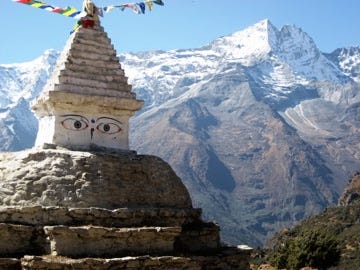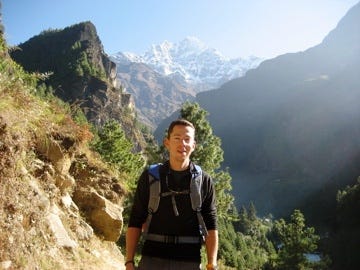Have a problem? Write an essay
Essays are the trek, and everything is a trail
A dozen years ago, I was reeling from a bad business deal while trekking in Nepal to the base camp of Mount Everest. The week-long trip to the base camp was a visual feast of prayer flags, Buddhist symbols, and incredible mountain views. But bitterness gnawed at my soul like a Himalayan mountain weasel on a dead mouse. My mouth said Namaste but my body felt What The F*ck. With every step on the trail, and every mind-numbing dose of altitude, the hungry weasel gradually calmed down. By the time I descended from the mountain, I could smile in the sunshine again. I’d worked through it.
There have been many points in my life when I’ve needed to process something spiritually, emotionally, or intellectually. In the past, my choice of venue was a trail in the wilderness or some foreign location where I could lose myself. These days, I find a similar effect from writing essays. Essays are my new, go-to way to work through things.
Life decision? Big ambitious idea? Life lesson to process? Write an essay about it, I say to myself. Essays are the trek, and everything is a trail.
When I sit down to write an essay, the blank page feels like a trailhead just before I take the first step, or an ancient mountain Buddhist temple beckoning me to look inside. I get that same feeling of possibility and adventure. I never know what it will have in store for me. I have to take steps to figure out what I really want to say, both literally and metaphorically. And when I finish an essay, or a trek, I am never the same person. I always feel less knotted and further along my path.
Writing essays is a spiritual practice, too. Sometimes the blank page, like the trail, feels cruel and taunting. Other times it feels inviting and invigorating. There are moments when the writing flows like a gorgeous Himalayan waterfall and other moments when I want to take off my shoes and hurl them off a cliff.
The editing process is like another day on the trail, when my feet are blistered and legs are sore and yet I’m getting deeper into the flow of the trek. Each draft takes me in and consumes me. Each day is a new iteration, a rebirth. My body adjusts to new altitudes. Perspectives shift.
If writing essays is trekking, then journaling is day-hiking. Journaling is raw, private and non-iterative, while essays are public, have form, and go through multiple drafts before final form. Journaling is rich, raw material for essays — a way to break in the hiking boots. When I read my drafts and roll my eyes thinking, this sounds a little too “Dear Diary”, I know that I’m heading in the right direction. Relatability is a power that connects us to the human experience, like blisters on our feet.
The blank page, like the wilderness, is a wide open space that is always there to heal trauma and work through emotional issues. The day after my brother Spencer’s body was found in the mountains of southern Oregon, I cried during a yoga class after years of judging weepy women for doing the same thing. I then penned an essay about it. Writing that essay helped me in the earliest moments of my grief.
Writing personal essays is a form of narrative therapy, where we re-author the stories we hold about ourselves. It reminds me of when friends and family ask about a trek after I finish one. How do I tell the story of the trek? Which aspects should I highlight? Writing about my political evolution has been therapeutic for me in a similar vein. My primary motivation is to help others learn from my experiences and heal our political situation. But I also do it to take ownership of my story, to reconcile past experiences and with where I am today through narrative. I don’t do this for the public but for me — for the story I tell myself.
Writing essays is an intense intellectual exercise, too. I live in my head and often come up with ideas I think are cute or clever. Writing essays about those ideas is like bringing a new piece of gear onto a trek and beating the sh*t out of it to see if it’s any good. The gear either survives and gets refined, or it gets tossed or left behind.
If my ideas survive the private test, hitting publish is like taking the gear-test public or using it on some scary technical climb. I might think a concept I come up with like micro-treason is clever, but the public might be like meh or slam it altogether. When the public receives an idea positively, it feels good. I’m as thirsty for validation as anyone. Nonetheless, I take more pride in essays that feel true than in ones that get clicks. Similarly, the pleasure of completing a trek is a private consolation, a sense of accomplishment, a transformative experience unto itself, not social media likes from trek selfies.
Writing essays is social too. I love meeting new people through my writings. Recently, a woman contacted me after reading my essays. She related to some of my personal experiences and we arranged a phone call. Even though we come from different political perspectives, it felt healing and heartwarming to connect. It reminded me of the people I met in the tea houses on the trail up Everest, those incredible moments of human connection that I never would’ve experienced if I hadn’t gone.
As with treks, some people may view essays as a form of navel-gazing, as something indulgent and unproductive. To this I would reply, Have you studied history? Essays have shaped history immeasurably. Think of Martin Luther’s treatises that kicked off the Reformation, Thomas Paine’s “Common Sense” that helped spark the American Revolution, or Marx’s “Communist Manifesto'' that gave rise to communist movements around the world. Essays gave rise to the civil rights movement (W.E.B Dubois), the environmental movement (“Silent Spring”), and feminism (“A Room of One’s Own”). George Kennan’s Long Telegram essay set America’s Cold War policy of containment.
Writing essays is one of the most productive things we can do. I couldn’t agree more with
, a writer on Substack, when she writes that “Writing increases your rate of revelation.” I would say the same about trekking — that it, too, increases the rate of revelation. It is not surprising that many of the most successful people in tech, like Paul Graham and Peter Thiel, are essayists. Writing essays is an alchemy that accelerates insights and healing.Today, I don’t need Mount Everest. I have essays. The benefits I found in Nepal are here on the page. The views aren’t as good, but the experience feels similar.
See you on the trail.
Special thanks to for reviewing drafts.
Recent Substack essays I enjoyed:





Jeff, this is terrific! You took me trekking in Nepal by way of your essay, in an essay about essays and Nepal. Not just a tongue-twister, and no small feat. Plus, I wasn't oxygen-deprived! I gather many nuggets that will help me in my own writing. Thank you. - James
Loving your essays, Jeff. Keep them coming. Big love.